Did you know that AI prompt engineering jobs can pay between $175,000 to over $300,000 a year? It’s a really appealing career path.
Exactly! It takes a lot more than that. You need a blend of skills in AI, language, programming, and even a bit of art to be successful in the field. It’s a really diverse and interesting mix!
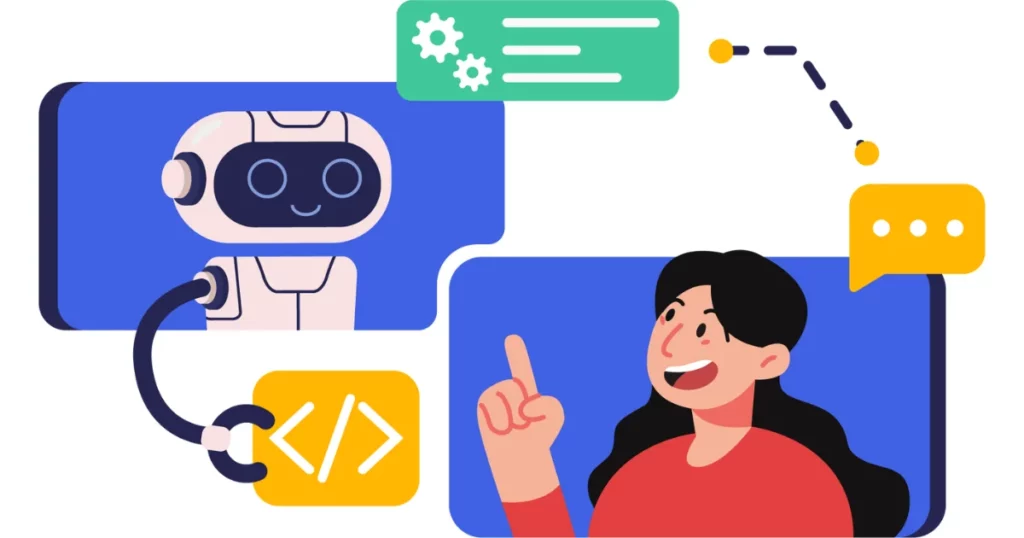
To succeed in this career, you need to be open to learning.
but it’s not just about being open. You’ve got to be hungry for knowledge, always seeking out new information, studying, and absorbing as much as you can.
If you’re constantly learning, you’ll be ready to grow and tackle new challenges.
We will discuss seven skills you should work on to become an AI prompt engineer.
Table of Contents
What is Prompt Engineering?
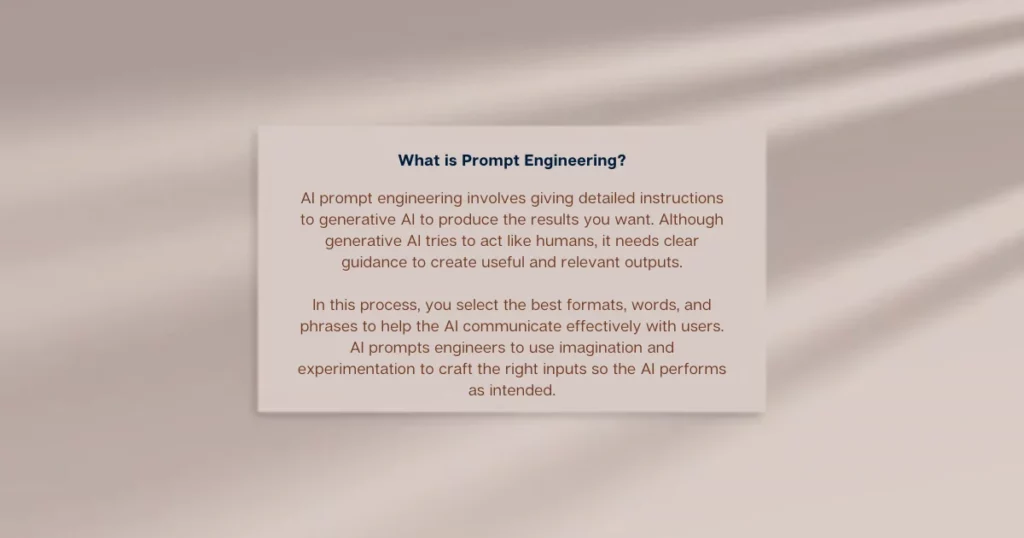
AI prompt engineering involves giving detailed instructions to generative AI to produce the results you want. Although generative AI tries to act like humans, it needs clear guidance to create useful and relevant outputs.
In this process, you select the best formats, words, and phrases to help the AI communicate effectively with users. AI prompts engineers to use imagination and experimentation to craft the right inputs so the AI performs as intended.
What Does an AI Prompt Engineer Do?
Prompt engineering helps users get the results they want on the first try. It reduces bias from the training data in AI models and improves how well the AI understands what users want, even with just a little information.
Learn 7 Skills to Become an AI Prompt Engineer in 2024
Find out how you can become a Prompt Engineer in AI in 2024 by learning these 7 skills.
- Develop domain knowledge and writing skills
- Problem statements should be clear and detailed
- Practice scripting and programming
- Learn AI, NLP, and ML
- Engage in creative conversation
- Understand AI governance and ethics
- Become patient and humorous
Look at this infographic which showcases a list of seven skills to become an AI prompt engineer.
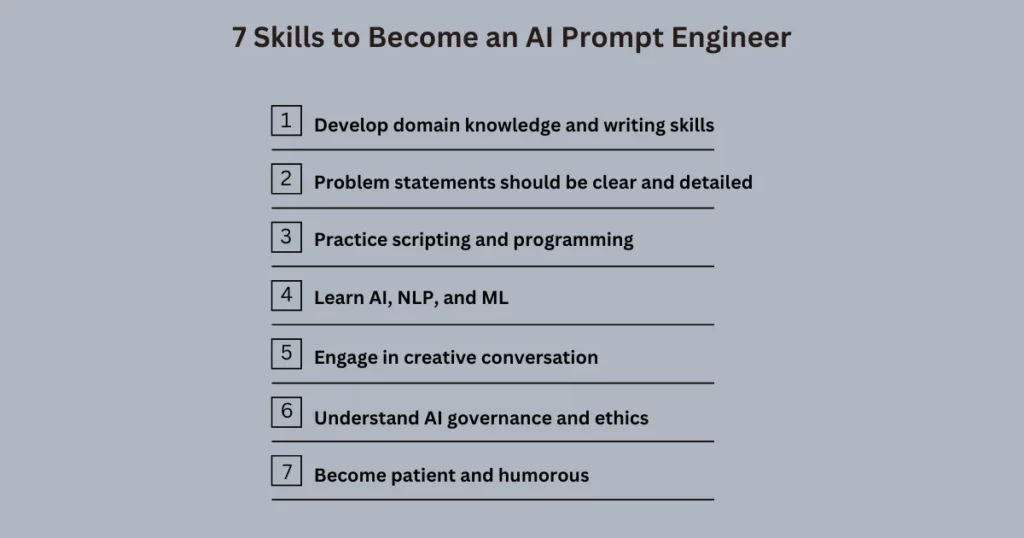
1. Develop Domain Knowledge and Writing Skills
You know, chatbots can not only write answers but also do it in any style you want.
We once used ChatGPT to write our text in the style of Harry Potter. We even asked it to write in the style of the cult movie Lord of the Rings.

We also set up our Etsy store using ChatGPT prompts.
Those samples were just for experimenting and fun.
You can operate different styles with graphics generators such as Midjourney. You can create images in a cinematic style, like those old 1940s cartoons.
So we took our usual Facebook profile picture and uploaded it to Midjourney. We used the drawing prompt to see what would happen.

It came out interesting! The style completely changed, and it has this drawing art vibe now.

When you’re working with art styles, it’s not just about understanding the styles themselves. You also need to have some domain expertise in the space you’re creating prompts for.
Like if you’re setting up prompts for an AI in auto diagnostics, you should know enough about cars to ask the right questions and judge if the answers are accurate or not.

It’s not just about the technical setup; you need to understand the subject matter too.
Get to know the plugins and extensions that your AI tools offer.
Why’s that important?
As time goes on, those add-ons will let you do things you can’t with just the basic tool. So, staying updated with these plugins not only keeps your skills sharp but also lets you do things that wouldn’t be possible otherwise.
2. Problem Statements Should be Clear and Detailed
At its core, it’s about communicating clearly. AI Prompt engineering basically consists of figuring out how to tell the AI exactly what you need. You need to be really clear about what you like from the interaction.
Let’s say you want to learn more about Salem (Oregon capital).

Well, first, you should specify what you like to know. Are you interested in the political setup, city management issues, traffic, or maybe the finest donut spot?

Second, you must clarify that you’re conversing about Salem City. There are other Salems in places like Indiana, Virginia, and Connecticut. You want to make sure there’s no mix-up!
One thing you’ll want to work on is explaining to the AI how to establish expectations. You need to help it understand the perspective it should take and the context of the situation you’re asking it to solve.
The clearer you are about what you’re asking and the context behind it, the better the AI will be able to provide valuable results.
So, when working with LLMs, you have to grasp their limitations and find ways to navigate around them.
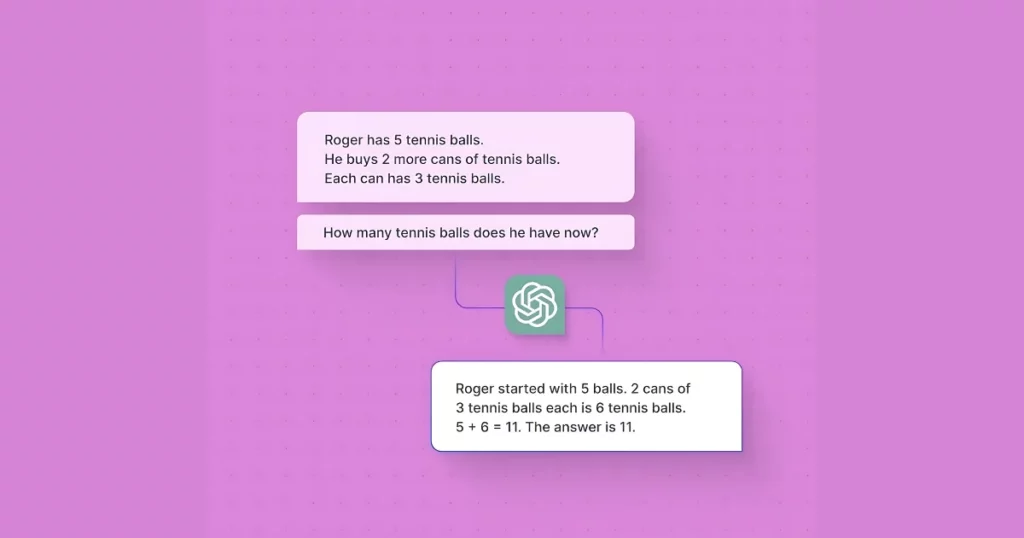
Like if you need a detailed white paper, it might be better to start by generating an outline and then write each section one at a time.
And don’t forget, a precise prompt doesn’t always mean a short one. Sometimes, longer prompts can actually lead to more accurate responses.
3. Practice Scripting and Programming
Have you ever noticed that when someone starts a sentence, they’re definitely going to say something?
Exactly! So, just to follow that pattern—although it’s obvious—we’re going to express that having programming talents would be useful.
So, are most prompt engineering jobs just about interacting with chatbots?
Not exactly. While some of those jobs do involve working directly with chatbots, the higher-paying opportunities usually involve integrating AI prompts into software and apps. That way, you’re adding unique value to the technology.

You might not have to write all the code, but if you can write some of it, test the prompts within the apps you’re working on, run debug code, and engage in the programming process, you’ll add a lot more value.
It would be way smoother than having to tack it on later and test it separately.
4. Learn AI, NLP, and ML
A good starting point is to get a solid grasp on how AI, natural language, and machine learning processing work.
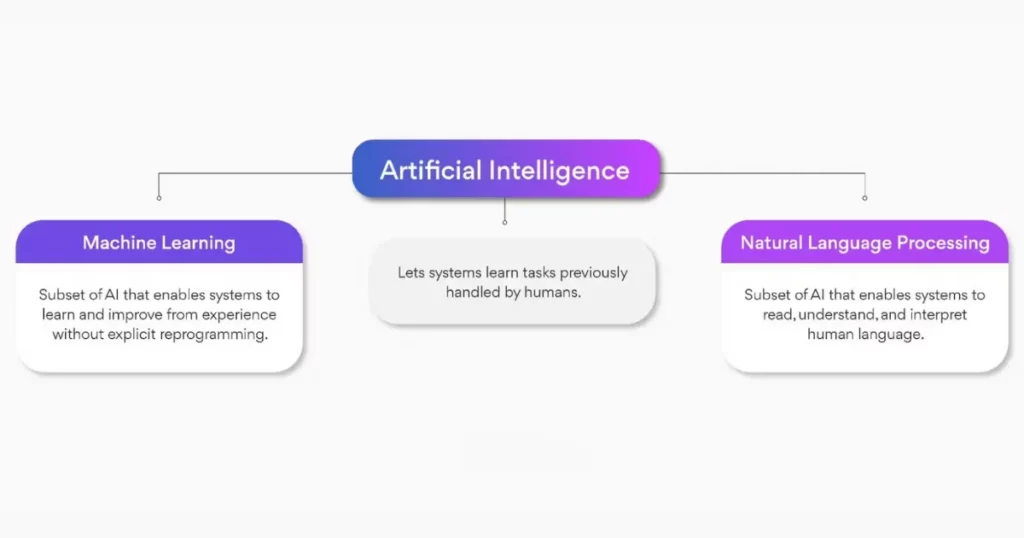
If you’re going to be working with LLM (Large Language Models), it’s important to comprehend what they are, the different types available, what they excel at, and where they have limitations.
You don’t have to build your LLMs, but you should get to know the ins and outs of the tools you’re focusing your career on.
The key is to dive into learning however you can. That means taking courses, reading technical papers and articles, going to conferences, and just experimenting on your own.
5. Engage in Creative Conversation
You know, AI prompt engineering is more about having a back-and-forth dialogue than just coding.
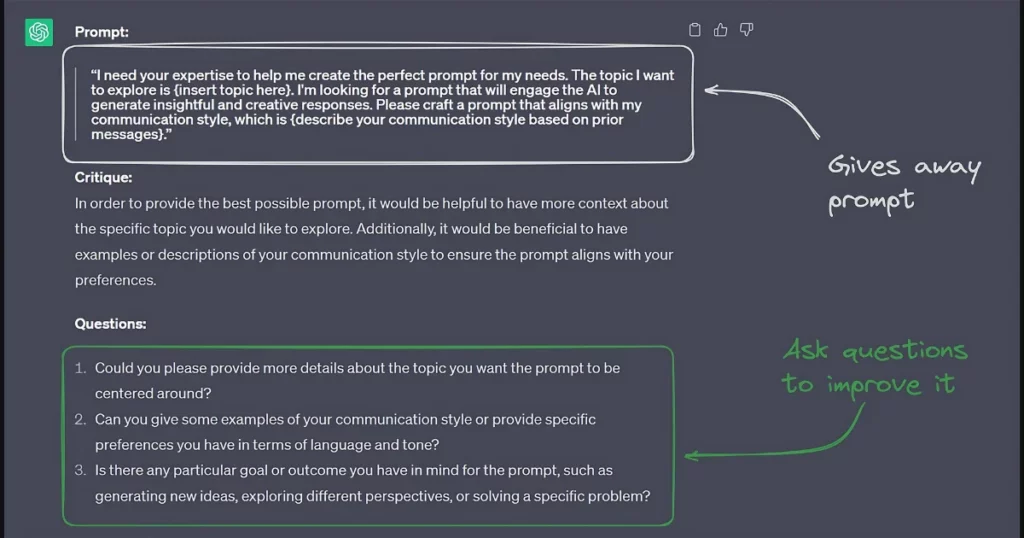
Even though LLMs aren’t sentient, their responses can feel like you’re chatting with a co-worker or someone you manage.
When you’re coming up with problem queries and statements, sometimes you need to believe outside the box.
You might have to explore different ways of asking questions or try various approaches to obtain the outcomes you’re aiming for.
If you want to know how we handle conversational gambits, check out our example in “How to Make Chat GPT Undetectable”
We were experimenting with various techniques to figure out which one would give us the results we wanted.
If you’re looking to get into AI prompt engineering, what kind of background should I have?
Having experience in debate teams or even sales can be helpful. Those activities will help you develop strong skills in persuasion, conversation, and collaboration, which are crucial for getting the best results.
6. Understand AI Governance and Ethics
When we talk about AI governance and ethics, what does that involve?
It’s all about grasping the moral side of AI, right? Making sure the technology is used responsibly and sticking to the right standards and regulations.
As AI becomes more common, engineers need to make sure their systems are fair, transparent, and respectful of human rights and privacy.
We also need to focus on deploying algorithms that are unbiased and ensure data privacy.
Understanding governance and ethics is crucial. It’s not just about gaining users’ trust but also about meeting the growing global regulations on AI.
7. Become Patient and Humorous
We think having a sense of humor makes it way more comfortable to be patient. Like, if something’s annoying, it’s less frustrating if you can find the humor in it.
Especially with these generative AI tools. They can be a real challenge.

They’ll mess up your requests, lose track of the conversation just when you’re about to make a breakthrough, and sometimes come up with answers that are just complete nonsense.
If you can’t laugh off some of the hiccups along the way, you’re in for a tough ride.
It’s like that with programming too. We always tell our students that patience is key. A lot of them get frustrated because their code doesn’t work perfectly on the first try.
It’s all part of the learning process. You’ve got to be prepared for those trial-and-error moments.
It seems like the people who didn’t make it through the course just didn’t stick with it.
On the flip side, even the ones who weren’t super passionate about coding but were willing to put in the effort, try and fail, research, and keep trying ended up being successful.
AI prompting is kind of like dealing with a bunch of different elements at once. You’ve got this super literal computer, a learning model that can be pretty unpredictable.
They always say patience is a virtue. but we think it’s more than that. It’s like a superpower!
Why Do AI Prompt Engineers Make So Much Money?
AI prompt engineers earn high salaries because there are not many of them, there’s a big demand for their skills, and the job requires specialized knowledge.
1. Low Supply, High Demand

The field of AI prompt engineering is new and growing quickly. There’s a big demand for people who can create and improve prompts for AI systems, especially generative AIs like DALL-E and ChatGPT.
As more companies use AI, the need for AI prompt engineers has gone up a lot, with job postings for these positions increasing by 42% in recent months.
2. Salary Ranges

AI prompt engineers earn high salaries, typically between $200,000 and $300,000, with some making even more. This pay reflects their specialized skills and the demand for their expertise.
They play a crucial role in enhancing the usefulness of AI technologies in industries like finance, healthcare, and marketing.
3. Specialized Skills

AI prompt engineers need a special mix of skills, including:
- Technical Facts: They should understand how AI models work, their limits, and biases. This helps them create prompts that produce relevant and accurate results.
- Communication and Creativity: This role needs creativity to come up with good prompts and powerful communication talents to connect what people want with what the machine produces.
- Interdisciplinary Expertise: AI prompt engineers work with experts from different areas like language, psychology, and technology to make sure AI results are ethical, respectful of different cultures, and meet people’s needs.
How to Learn AI Prompt Engineering?
To learn AI prompt engineering well, you can find various resources and courses that match different skill levels and topics. Here’s a quick overview of some good choices:
1. Prompt Engineering Basics in Generational AI
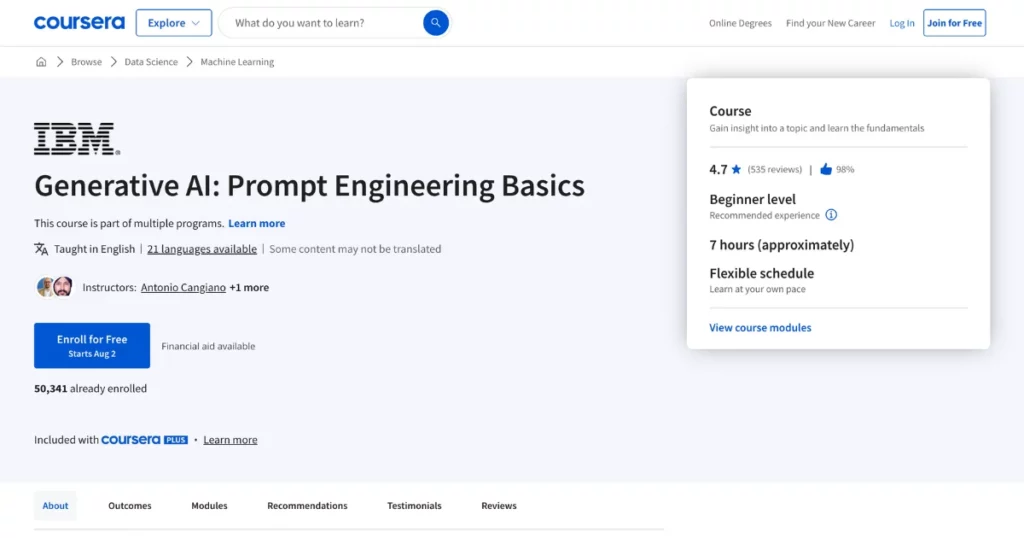
This beginner course, led by Antonio Cangiano, teaches you the basics of writing good prompts for generative AI models. You’ll learn:
- The importance of prompt engineering.
- How to create effective prompts.
- Tools for prompt engineering.
The course includes videos, readings, hands-on labs, and reading to rehearse making prompts, perfect for anyone who wants to use tools like ChatGPT.
2. DeepLearning.AI – ChatGPT Prompt Engineering for Developers
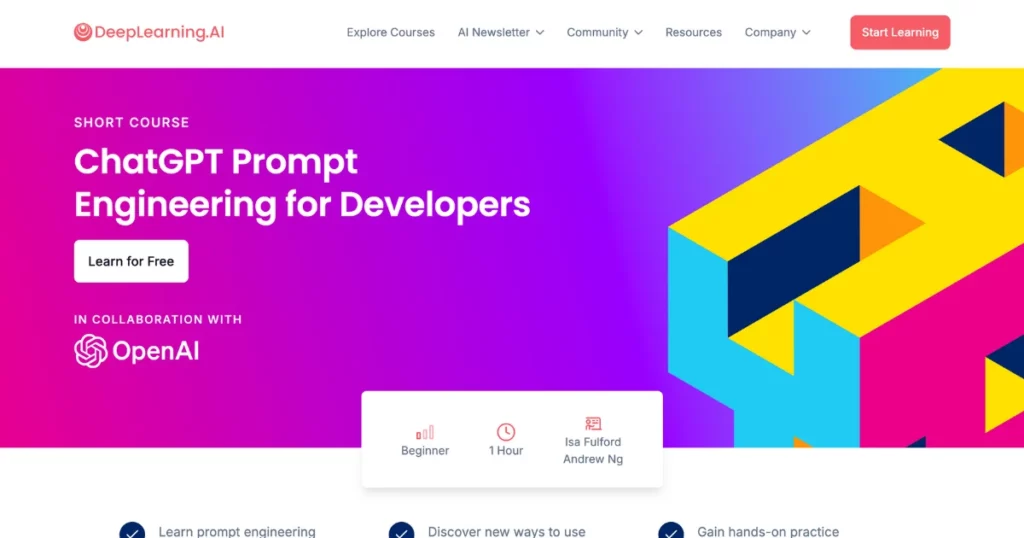
This course is made for developers and teaches how to use LLMs for building applications. It includes:
- Best practices for creating effective prompts
- Practical exercises with the OpenAI API
- Methods for tasks like summarizing, reasoning, and transforming text
It’s great for beginners and also useful for advanced learners who want to improve their skills in prompt engineering.
3. Complete Prompt Engineering Course – PromptEngineering.org
This course is made for both professionals and those looking to become prompt engineers. It covers:
- Basics of prompt engineering and what prompt engineers do.
- Techniques such as zero-shot, few-shot, and Chain of Thought Prompting.
- Practical skills for creating and improving prompts for different AI models.
It’s suitable for beginners as well as experienced people wanting to improve their skills in working with AI.
To Summarize
We’ve listed seven skills you’ll need to succeed as an AI prompt engineer.
Not quite. Those are rough guidelines. It’s a personalized journey, so you must carve out your path.
It’s really important to stay curious about AI. The field is so vast and evolves so quickly.
You’ve got to dive in deeper, ask lots of questions, and keep that curiosity alive.
The more questions we ask, the more we uncover, and the better we get at turning that knowledge into practical results.
If we could offer you one crucial tip, it’d be this: Just experiment. Find projects that genuinely affect you and start creating something.
Trust us, getting hands-on experience will get you much further than any list you might find online.
Why don’t you dive into AI prompt engineering? Maybe build a few small apps and take that course we mentioned.
Well, if you get hands-on with it, you’ll not only move from just wanting to do AI prompt engineering to actually doing it, but you’ll also have something concrete to show for it.
Just go for it. If you take the leap, you’ll become what you want to be.
FAQs
What is the role of AI prompt engineer?
An AI prompt engineer’s role is to ensure the AI communicates in your company’s style and reports on its strengths and areas for improvement.
How to Get a Job as an AI Prompt Engineer?
To become an AI prompt engineer, learn about natural language processing, machine learning, and language skills. Create a portfolio that shows off your work with prompts. Connect with people in the industry and apply for jobs at tech companies and startups focused on conversational AI. Emphasize your skill in improving prompts for better model performance.
How long does it take to become AI prompt engineer?
It depends on what skills you have. If you know how to code, learn the basics of prompt engineering in a few hours and get better at it in a few days. If you don’t know Python, it will probably take about two to three months to get the basics down.
Related reading:

